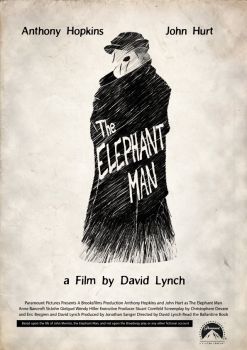The Elephant Man
Dir: David Lynch
Starring: John Hurt, Anthony Hopkins, John Gielgud, Anne Bancroft, Freddie Jones, Wendy Hiller, Hannah Gordon, Michael Elphick, John Standing, Dexter Fletcher & Helen Ryan.
118 mins | Drama, History | PG
First released: 1980
I’ve been so furious over the Golden Globes. How Kyle Maclachlan did not win an acting gong for Twin Peaks: The Return remains a great mystery. Yet, David Lynch has always gotten supreme and unique performances from his actors. This is proven as way back as 1980 with John Hurt, in a film that is now both revered and beloved.
The Elephant Man is the true story of Joseph Merrick (wrongfully named John here), a young Englishman who is plagued with horrendous deformities in late Victorian London. Treated sub-human by his owner, Doctor Frederick Treves saves him and begins to realise he can talk, can write and proves to be a gentle and compassionate soul. Through perseverance, Treves makes Joseph the toast of society, acquiring support from actors, royalty and the public. Though his circus freak show past comes back to haunt him, can he prevail in his new role or will his health also drag him down?
Perhaps the best film ever created about disability, it tackles the subject with great sensitivity. The pity you feel for this poor fellow quickly vanishes, as you see him blossom into a fine gentleman. The makeup here by Christopher Tucker is some of the finest you’ll see in cinema. Hurt is entirely unrecognisable, such was the extremity of Merrick’s condition (we now know he had neurofibromatosis). The Oscar for Best Makeup would only be created the year after the film’s release, such was its impact. Even with eight nominations for The Elephant Man, it is still an injustice that it didn’t pick up a single award. Even producer Mel Brooks was furious!
There also appear to be two sides to this story: one is the truth of Merrick’s life and the other is the mythos which came after. The late 1970s to early 1980s would not only see Lynch’s cinematic take on the sort, but was also a Broadway play (featuring David Bowie) and a made for TV film as well. Various source material features in all these adaptions, and none of them truly have the full history. We know that Bytes, who owned Merrick, never hit him. Treves was in fact arrested for exhibiting Merrick at a lecture and the truth about the latter’s early death has never fully been revealed. Whilst this cinematic version tries to wave away the legend, these are some glaring inaccuracies by today’s standard.

Another question lingers: how much of this feels like a David Lynch film? Granted, the opening may be a vision of an actual elephant assaulting Merrick’s mother, thus perpetuating the legend that this caused his condition. What really creates the impact here is the use of slow motion (with the mother screaming in a blurred state) and Lynch’s “ethereal whooshing” that we’ve grown to love so much. With none of the electricity (his acclaim plaything), Lynch has to make do with machines, pipes and heaters to create a relentless ambient undertone.
After The Straight Story, this is certainly his most approachable film by anyone’s standards. Even the flickers of the Avant-Garde, which we will see so much of in later work, peppers the film and creates the gloom of late 19th century setting. Even a shot of the camera going into Merrick’s eye hole would be seen again in Inland Empire as a cigarette burn through silk. The muck and filth of the time seems to be right up this eccentric director’s street as well.
John Hurt delivers such a tender and compassionate performance here. To be able to act under all that makeup is a triumph and we become so moved by this. Many moments induce tears, including the train station scene, the home visit to Treves’ house and meeting his wife (Hannah Gordon first saw the makeup on Hurt in their first take together), the Romeo and Juliet scene and the ending which is another altogether kick in the gut. Anthony Hopkins as Treves is startling, deeply rooted in his determination to make his “discovery” a welcome asset of high society. A surprising ensemble of British greats also feature and even early roles for the likes of Dexter Flecher, Patricia Hodge and Pauline Quirke feature.
Shot entirely in black and white, it has a period feel most films have yet to emulate. The score by John Morris is also brilliant: its deeply rooted empathy for Merrick and its pain shines through. The earworm that is the opening theme comes back to haunt throughout the entire film and the harmonic richness that complements scenes is also rousing.
The Elephant Man is mandatory viewing, though it’s very much a film which can make even the most stony-eyed cry buckets.
A stunning exercise in humanity & dignity.
Rating:🌟🌟🌟🌟🌟
Related Articles:
Archive: In Dreams: David Lynch Revisited @ Colston Hall
–
Review: Twin Peaks – Season 3, Episodes 1 – 4 on Sky Atlantic/Now TV




